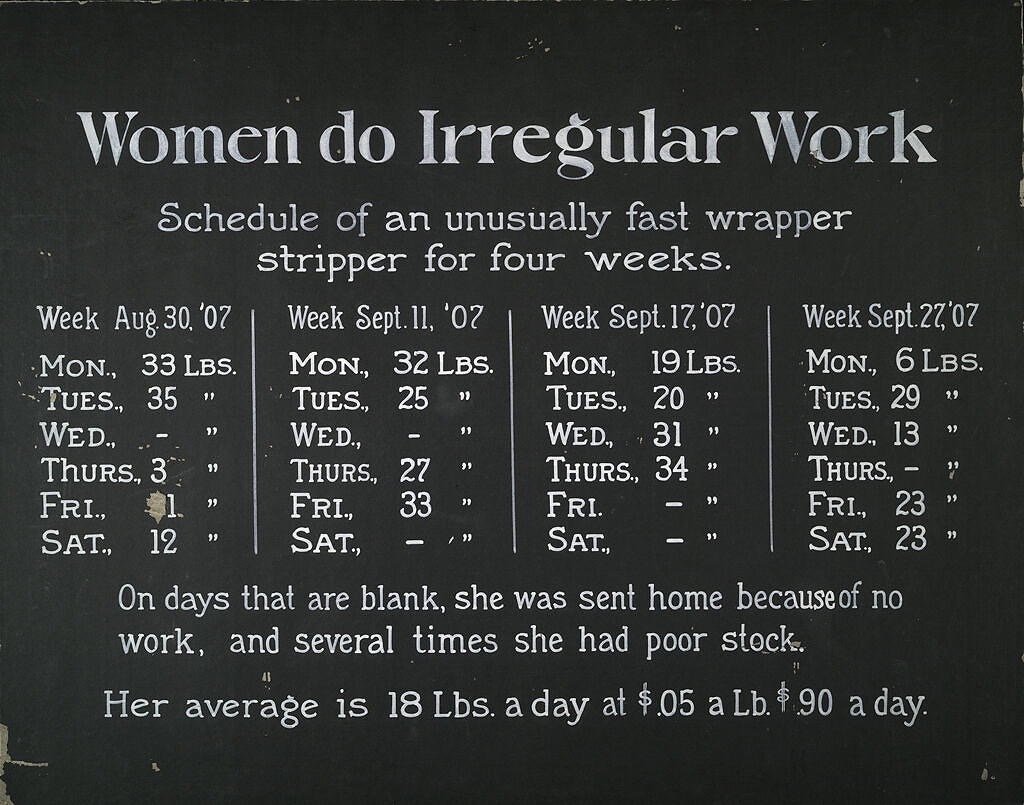Scheduled

Lewis Wickes Hine: Women do Irregular Work,
Schedule of an unusually fast wrapper stripper for four weeks.
Series/Book Title: Social Museum Collection
(1907-1908)
"It was only ever eternal in the moment before it was declared done."
My dental hygienist reported that she was Scheduled into next year and booked solid into November, six months hence. Her dentist was booking into the following month, and so couldn't possibly perform any procedure not previously Scheduled. I once maintained such a schedule where I could reasonably predict my position months into the future. I inhabited a speculative reality, one capable of containing me every bit as effectively as any jail cell might have. I willingly entered, feeling secure in there rather than imprisoned. Call it job security, but I felt a real sense of certainty then. I later became a freelancer and lost most of my previous confidence. Then, I felt as though I was constantly juggling, coniving to survive somehow. Like the biblical Birds of the Field, though, I rarely starved. Plenty manifested before me, even in the absence of a tangible Schedule. I came to understand that Scheduled might have always been more of a preference than an imperative. In the absence of a Scheduled horizon, I'd reliably stumble upon one that managed to sustain me. This experience amounted to heresy.
I worked in the Project Management field. If ever a profession existed that might seem to utterly rely upon Schedules, Project Management would be it. We explicitly denigrated those who'd go naked into their future, convincing ourselves that well-formed Schedules were imperative. We told ourselves this convention was more than mere convenience, that it was just more efficient to lay out our future in well-thought-out milestones. We could plan ahead and prepare ourselves for every delivery long before it came. We could calculate critical paths and navigate routes of minimum effort and thereby produce efficiency and reliable estimates. But then something inevitably disrupted our carefully-calculated convergences. Some elements would end up being delivered later than initially anticipated, or, heaven forbid, another might appear early. Then our carefully calculated roadmap would mislead us and require reimagining. In practice, no schedule ever unfolded as anticipated and could prove to be a distracting barrier to proper adaptation. The purpose of most Scheduling ended up being discarding. They were never precisely garbage, but they ultimately might as well have been.
Much of the effort of every project was focused on believing. We'd feel the need to plan, but never merely superficially. We felt the real and pressing need to know beforehand, a bit of conjuring we never once succeeded in accomplishing. We avoided cynicism by understanding just how critically important our conclusions would prove to be. We'd need them to help us assess our progress and to guide us through inevitable complications. We said we all needed to be on the same page, though I suppose we were never more than trending toward that state. The Schedule proved most useful when we'd try to ascertain whether the schedule was still useful. It proved most useful when we found it was no longer useful. This discovery would prompt another effort intended to reinstitute the belief we still thought necessary to make any real progress. We would not tolerate proceeding without an explicit schedule because that would just be wrong. However, between discovering the schedule was no longer useful and creating fresh iterations, most of every project was spent intestate: without a currently considered accurate portrait of our upcoming future. We rarely slowed down to replan because we feared losing our sacred momentum.
It would never do to lose belief in the Schedule, though. A project team needs something to believe in, or they tend to descend into chaos; much progress results from momentum. Replans serve as after-the-fact course corrections and often misguided anticipations of imagined required future corrections. So much of whatever was scheduled never came to pass, so it might seem reasonable to resort to a Birds of the Field Strategy and just wing it. We were winging it anyway, but we seemed to need to deceive ourselves into believing we possessed some semblance of prescience. Almost nobody ever does. Schedules serve as effective distractions, enabling us to inhabit futures, mainly for purposes of reassurance. We project a comforting horizon without realizing that we're projecting fiction. This eternal dance continues until it fails, at which point we commence to successfully fool ourselves again. Those who believe themselves masters of their future, are. Those who cannot muster an ounce of belief in some reassuring fiction seem screwed from the outset. They miss a subtle and confusing point. It was not whether the Schdedule turned out the way it was projected, but what you did next that inevitably made the difference. The schedule started degrading the instant it was declared finished. It was only ever eternal in the moment before it was declared done.
©2025 by David A. Schmaltz - all rights reserved


